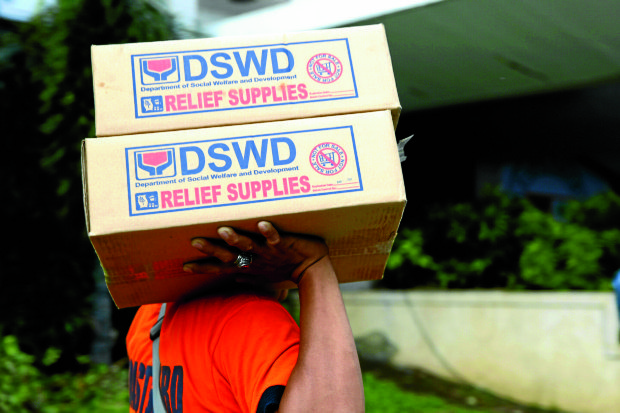
FILE PHOTO: DSWD relief operations. INQUIRER FILES
MANILA, Philippines — The Department of Social Welfare and Development (DSWD) has reminded the public not to be fooled by political candidates making false promises about the Pantawid Pamilyang Pilipino Program (4Ps).
The DSWD stressed in a statement Thursday that 4Ps “cannot be, in any way, used for electioneering or any partisan political activities.”
READ: DILG to officials: Don’t use gov’t beneficiary programs in election campaign
The DSWD’s reminder comes as the country is set to hold the Barangay and Sangguniang Kabataan Elections (BSKE) on Monday, October 30.
Reports indicate that many political candidates in the 2023 BKSE use the 4Ps, Assistance to Individuals in Crisis Situation or AICS program, and other national government aid projects to entice constituents to vote for them.
READ: EXPLAINER: Vote-buying, selling
In an interview during the pilot episode of the DSWD Media Forum, Assistant Secretary Romel Lopez said: “Sa atin pong mga kababayan, kahit sino pong mangako sa inyo na kayo’y mapapasama sa 4Ps program, malamang hindi ho magkatotoo ‘yan.”
(To our fellow countrymen, no matter who promises you that you will be included in the 4Ps program, it will probably not come true.)
“DSWD data lang po ang tatanungin. DSWD personnel din lang po ang makakapag-assess po sa inyo – hindi po kahit sinong kandidato,” he added.
(Only DSWD data will be referred to. Only DSWD personnel can assess you – not any candidate.)
READ: DSWD probes ‘Socorro cult’ getting 4Ps cash grants, members’ pensions
Citing 4Ps National Program Management Office Director Gemma Gabuya, the DSWD said the project only utilizes the National Household Targeting System for Poverty Reduction or “Listahanan” in determining the profile of poor beneficiaries.
The DSWD also clarified that inclusion to the Listahanan does not guarantee automatic inclusion to the 4Ps as the list merely serves as a database indicating the profile and location of poor households.
READ: DILG, Comelec on lookout vs vote-buying via e-wallet
The DSWD explained that the 4Ps is a human capital development program in which the government invests in the health, nutrition, and education of poor households. The program aims to break the intergenerational cycle of poverty among them.